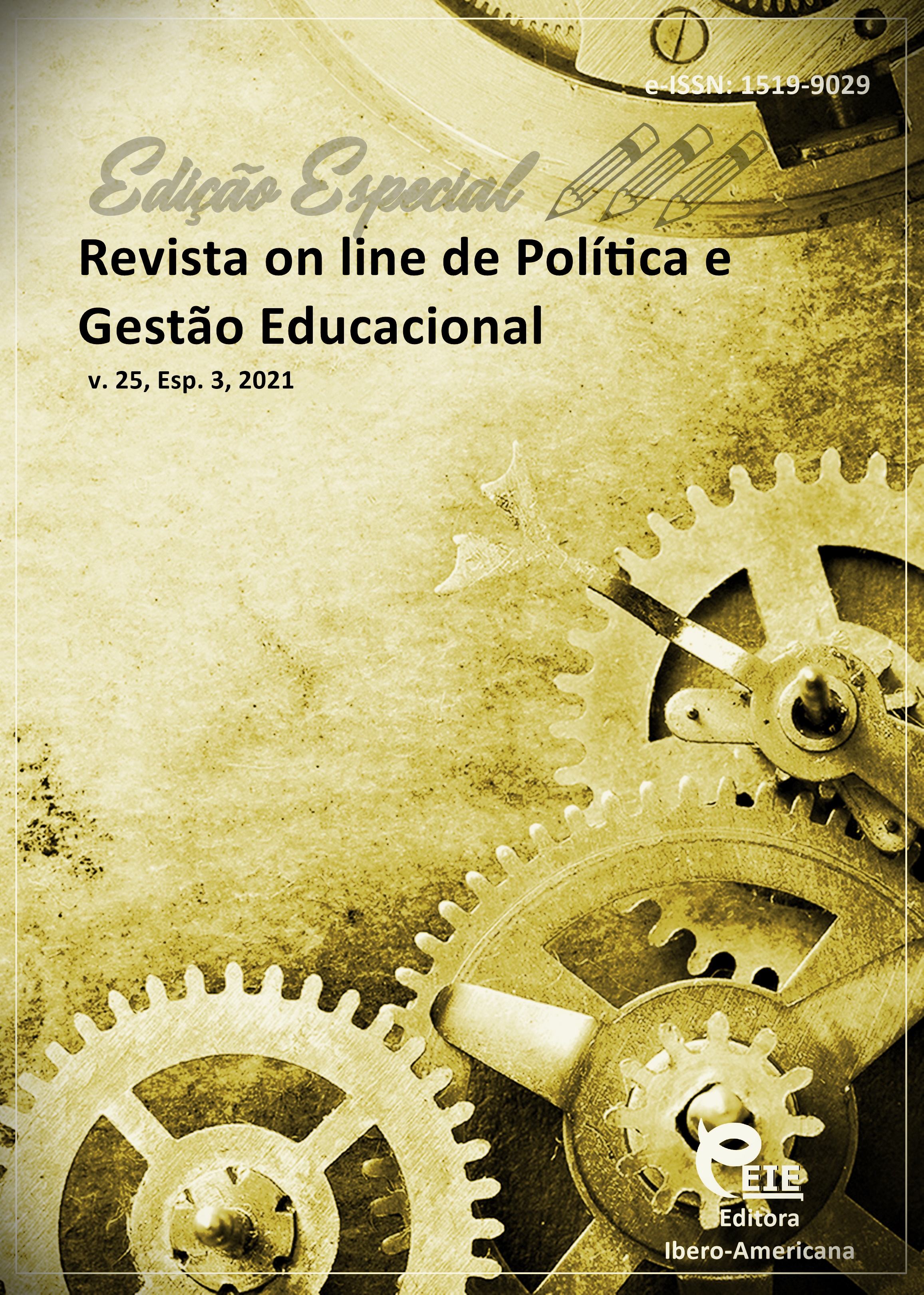Issues of training art teachers in the context of educational innovations
DOI:
https://doi.org/10.22633/rpge.v25iesp.3.15592Keywords:
Teacher, Education, Artistic empathy, Style culture, Performing self-efficacyAbstract
The purpose of the work is to determine the personal qualities of a music teacher that contribute to the effectiveness of his artistic and educational activities in modern conditions, the theoretical development of the essence, content, and component structure of the categories “artistic empathy”, “style culture of performing musical works”, “artistic and performing self-efficacy of the individual”. Using the methods of questioning, testing, pedagogical observation, and analysis of lessons in the system of arts faculties of pedagogical universities of Ukraine and statistical processing of the materials obtained, the state of modern practice of professional training of future musicians is characterized. As a result of the study, it is argued that these qualities are among the dominant professional and personal qualities of a modern music teacher. The article confirms the prospects for forming these professional and personal qualities precisely in the process of special musical training of students.
Downloads
References
DENSITY, H.A. Axiological aspects of domestic education as a factor in the formation of professional and value orientations of the future teacher. Kaluga. 2004.
DIKUN, I. The content and structural characteristics of future Music teachers’ creative activity experience. Intellectual Archive, 1(6), 51-58. Toronto (Canada): Shiny Word.Corp. 2017.
DUBOVY, Z.S. Specifics of distance learning of future music teachers. Methodical practice: a journal for teaching and learning. Belgrade: Faculty of Teacher Education in Vranje and “School Book” DOO in Belgrade, 1,125-129. 2019.
GAO RUOJUN. Forming the ability to self-control - an important factor 0f improving the piano teaching and performance of future music teachers. Intellectual Archive, 3(7), 116-127. 2018. Toronto: ShinyWord.Corp. (Canada).
GUSACHENKO, O. Valorificarea strategiilor inovaționale de dezvoltare a învățământului artistic contemporan″, conferinţă ştiinţifico-practică internaţională. Bălți, 116-122. 2018.
HUANG CHANGHAO. Current trends in the development of vocal education future music teachers. 2017.
HUANG HANJIE. Musical-scenic partnership in the training of music teachers. The modern system of art education: formation, development, innovation. Astana: KazNUI. 2017.
KHOMICH, I.M. The structure of the readiness of future teachers of art disciplines to work with the choir. Yearbook of the Pedagogical Faculty in Vranje. Cataloging in the publication of the National Library of Serbia, Belgrade. 2016.
LIANG, H. A component structure of readiness of future music masters is to vocally-choral work with application of project technologies. KELM Scientific issue of knowledge, education, law and management. Wydawca: Fundacja «Oświata і Nauka Bez Granic PRO FUTURO», 2(18), 84-93. Łódź. 2017.
MALASHEVSKA, I. The Main Principles of Music Education of Preschool and Junior School Age Children during Music Therapy Training. Znajduje się wmonografii pt. Dobro i zło w wychowaniu dziecka. Kraków, 27-31. 2017.
PROVOROVA, E.M. Preparation of the future music teacher for lesson design: praxeological approach. Scientific journal “ScienceRise” Pedagogical education, 10/5 (15), 49-53. 2015.
PUHALSKY, T.D. Diagnosis and analysis of the levels of professional competence of future teachers by means of conducting and choral disciplines. Proceedings from international scientific conference: advances of science. Czech Republic, Karlovy Vary. 2018.
SHPITSA, R.I. Innovations in the integrated Music lesson: educational call of modern realias in comprehensive schools. Science and рractice: Collection of scientific articles. Thorpe Bowker. Melbourne, Australia, 307-310. 2016. Available: http://enpuir.npu.edu.ua/handle/123456789/11880
SMIRNOV, S.D. Pedagogy and psychology of higher education: from activity to personality: textbook. manual for students of higher educational institutions. Moscow: Publishing Center “Academy”. 2001.
STRATAN-ARTYSHKOVA, T.B. Creative and performing training of future music teachers. Monograph. Kirovograd: KSPU named after V. Vinnichenko. 2014.
STROHAL, T. YR. Methodical basis of using innovative art therapeutic technologies in the process of teenagers’ emotional and aesthetic experience formation. Intellectual Archive, 1 (6), 89-101. Toronto. 2010.
SUN, P. Semiotic art interpretation skill in music teacher’s training process (pedagogical principles). The Scientific Heritage, 15, 41-47. Budapest, Hungary. 2017.
TSYUMAN, T.P. Code of safe educational environment. Kyiv: Ukrainian Foundation for the Welfare of Children. 2018.
WANG, K. Formation of heuristic thinking of future teachers of music art and its results. EUROPEAN HUMANITIES STUDIES: europejskie stydia humanistyczne: Psychological, pedagogical and organizational conditions for the introduction of European standards of higher education: State and Society. Slupsk, Poland, 1, 51-61. 2016.
ZAITSEVA, A.V. Artistic and communicative culture of the future teacher of music: theory, methodology, methodological aspects: monograph. Kyiv: M.P. Drahomanov National Pedagogical University. 2017a.
ZAITSEVA, A.V. Methodical recommendations “Pedagogical guidance of the process of formation of artistic and communicative culture of the future music teacher”. Kyiv: M.P. Drahomanov National Pedagogical University. 2017b.
ZHUITIN, L. Component structure of formation of musical and aesthetic taste of teenagers. Science and Education a New Dimension. Pedagogy and Psychology, VI (68), 51–55. 2018.
Published
How to Cite
Issue
Section
License
Copyright (c) 2021 Revista on line de Política e Gestão Educacional

This work is licensed under a Creative Commons Attribution-NonCommercial-ShareAlike 4.0 International License.
Manuscritos aceitos e publicados são de propriedade da Revista on line de Política e Gestão Educacional. É vedada a submissão integral ou parcial do manuscrito a qualquer outro periódico. A responsabilidade do conteúdo dos artigos é exclusiva dos autores. É vedada a tradução para outro idioma sem a autorização escrita do Editor ouvida a Comissão Editorial Científica.










